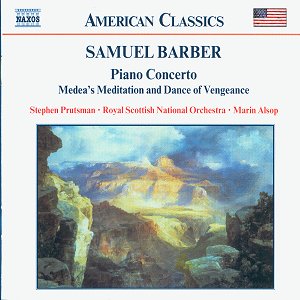The Naxos American Classics series goes from strength
to strength. This latest issue from the Royal Scottish National Orchestra
and Marin Alsop maintains the high standards of playing and recording
of their previous issues; and now that Alsop has become principal conductor
of the Bournemouth Symphony Orchestra, her profile in British musical
life will become stronger still.
Naxos is rightly proud of its imaginative approach
to repertoire, and this collection features some well known Barber pieces
alongside rarities. The major work is undoubtedly the Concerto, which
receives an excellent performance from the American pianist Stephen
Prutsman. While he does not eradicate memories of the classic recording
by the work's first soloist, John Browning (Sony Classical), he has
both technical command and sensitivity at his disposal, features which
Barber placed as equally significant in this and other large-scale compositions.
The recorded balance places the piano centre stage a little more than
in the obvious sense, and some instrumental details are lost among the
orchestral contributions. These are not a major problem, but there is
more detail in the orchestral score than comes over on occasions here.
However, the performance itself is exemplary.
Medea's Meditation and Dance of Vengeance is
surely one of Barber finest works, a twelve-minute showpiece, at once
atmospheric and exciting. He drew upon music from his existing ballet
score of 1947 - already recorded in this series - when he completed
this orchestral piece eight years later. The Meditation is beautifully
played here, with some fine string playing in particular, and very well
balanced by the conductor. As a result the Dance makes a stronger
impression still, when the full and accurate recorded sound comes into
its own. The disc will repay its modest outlay for this performance
alone.
The other items are less well known. Die Natali,
a slighter piece contemporary with the Piano Concerto, is entertaining
enough, a sequence of variations on Christmas carols. Whether it bears
repeated listening is open to question. But the occasional outing will
do no harm, and the colourful scoring and excellent playing of the Scottish
orchestra bring their rewards.
The short Commando March, composed for the U.S.
Army Air Force Technical Training Command Band (sic) in 1943 when the
war was at its height, is here offered in its later orchestral version.
This was introduced by Koussevitzky in Boston later that year, and makes
a suitably stirring impression.
Terry Barfoot


